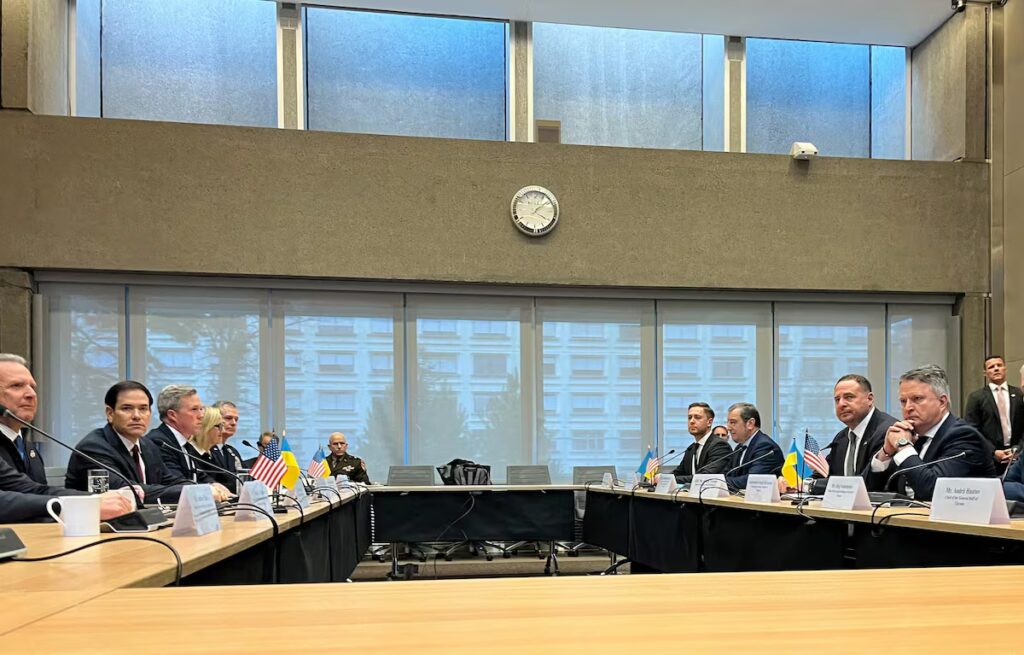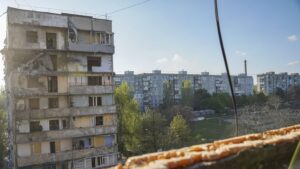
After almost four years of war with a very high cost in human lives, peace in Ukraine is priceless. It is certainly a statement to which no one finds any moral fault. But this does not exclude the need to rebuild the devastated economy of the invaded country and its inhabitants, even the weakened one of the aggressor country, and that this does not have a cost that needs to be quantified, because someone will have to pay for it and someone will have to carry it out with a succulent company bonus. As is now proposed, pending revisions in the final battle, Russia will be the great military and political beneficiary, but the peace dividends will be pocketed by the United States, as well as the countries of Eastern Europe, where the continent’s growth will move. It will take years for Ukraine to regain its economic status, and it will do so by cutting off its territory and its geostrategic desires.
There will be more victims than Ukraine or Europe, which will once again be marginalized in the design of its own security policy, since Atlanticism as a defense bloc and multilateralism as a formula for the functioning of the global balance are seriously affected, and both as a consequence of Trump’s heterodox policy, no matter how much merit he believes he has after having put an end, if ever ended, to two of the most dramatic, longest and closest conflicts to the borders of the European Union. Never before has a NATO member, much less the most powerful of them, become so passionate and intimate with an adversary and so brutally scorned his allies as the occupant of the White House has done in this case, no matter how much he tries to correct the situation at the end of the negotiations.
The peace plan drawn up by Moscow (party) and Washington (judge and party) has little chance of correction by Europe, and even less by Ukraine, whose leader has already hinted that he will have to choose between losing his honor or losing a fundamental ally. But, judging by the content of the first draft agreement between one of the parties and the judge, Kiev will lose honor (territory) and will have to share an ally who has more preferences for its opponent than for itself. If peace is signed according to the proposed terms, the major economic beneficiaries of the armistice will be the United States, and secondarily the two conflicting economies and the European countries closest to the Russian and Ukrainian borders.
The United States has secured the lion’s share of the peace dividend by creating a comprehensive reconstruction package for Ukraine, with large investments in technology-, data- and AI-intensive infrastructure and industries, and which will be financed in part by funds withheld from Russia (around €86 billion) and an additional reconstruction contribution of €100 billion from the European Union. Furthermore, the United States intends to be the privileged ally in the exploitation of the gas pipelines that cross Ukrainian territory: it is colonialism done in trump.
But it extends its dividends to also participate in the reconstruction of Russian infrastructure in the war zone, with financial and industrial contributions, as well as investing the other half of Russia’s frozen funds in the reconstruction of its economy, and the commitment to jointly exploit the rare minerals of the Arctic, in exchange for Russia’s return to the G8 and the elimination of all sanctions imposed on its economy and its leaders. The reward proposed to Kiev is the possibility of realizing one of the dreams that have kept Putin awake, namely that of joining the EU.
The Ukrainian economy will never be the same again, also because it will be forced to lose territories (Lugansk, Crimea – occupied since 2014 -, an important part of Donetsk and the occupied part of Kherson and Zaporizhzhia, even if Kiev shows firmness in not giving them up, and the end is near) and to defend itself with an army that is triple the size of the one before the war, with the additional costs it has, and it will not share them with NATO, since it will not be able to join due to the imperative of the peace treaty, just as the Alliance will not be able to extend its dominions.
Furthermore, it will not be able to develop atomic energy and may have to share the energy of the Zaporozhye nuclear power plant 50/50 with Russia, which it absolutely refuses to do. In short, the economic conditions of the pact were designed by Trump, and the geostrategic and defense ones by Putin, and for these they ask Ukraine for hesitant membership.
Europe, barring a miracle in a negotiation in which it has been ignored until this week, following the tradition of all conflicts east of its borders, will have to contribute an enormous amount of resources that it will have to divert from other financial commitments at a time when its growth is low and asymmetric and its chances of recovering industrial and technological sovereignty are limited. Furthermore, it will not be able to give in to its renewed commitment to defense, because this episode and a resolution like the one on the horizon confirm that Moscow is dangerously expansionist and that the risk of it reproducing itself on Ukrainian soil or on another border with Russia is evident: it has not weakened, it has intensified.
For a few years, yes, it will find peace and perhaps its economy will reactivate on a global level. But the most intense activity will move to the eastern countries of its territory, the same ones that have had a very notable decline in their economic performance since the beginning of the war. A recent European Commission report indicates that in 2022 and 2023, countries bordering Ukraine and Russia lost two points of growth in each of those years, and between 1.1 and 1.3 percentage points per year in countries that were within a thousand kilometers of the Russian border, even if they did not border it.
The cost was concentrated in the price of energy due to scarcity, in trade flows, inflation, consumption, employment and financial costs where the protection of the euro did not exist, and public spending and its fiscal deficits underwent a forced increase, with progress in defensive spending and less attention to productive investments. The most limited effects were concentrated in the most remote countries, such as Portugal, Spain, France, Italy, Belgium and Ireland.
Now this situation could be reversed, and it cannot be ruled out that countries like Spain, Portugal and Italy will have to share their traditional tourist bonus with the eastern coasts, which they enjoy both when there are conflicts on the other side of Europe and when peace returns. What they will have to compensate for is the reduction in resources for investments that will be allocated to the East and to reconstruction, of which Spanish companies, with a few exceptions, will be spectators.





